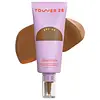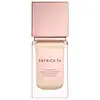Tower 28 Beauty SunnyDays Tinted SPF 30 Versus Patrick Ta Major Skin Hydra-Luxe Luminous Skin Perfecting Foundation
What's inside
What's inside
 Key Ingredients
Key Ingredients

 Benefits
Benefits

 Concerns
Concerns

 Ingredients Side-by-side
Ingredients Side-by-side

Zinc Oxide 12.6%
Cosmetic ColorantWater
Skin ConditioningIsononyl Isononanoate
EmollientC9-12 Alkane
SolventButyloctyl Salicylate
Skin ConditioningPolyglyceryl-6 Polyricinoleate
EmulsifyingCaprylic/Capric Triglyceride
MaskingGlycerin
HumectantEthylhexyl Methoxycrylene
Skin ConditioningTrimethylsiloxysilicate
EmollientMica
Cosmetic ColorantPolyglyceryl-2 Isostearate
EmulsifyingSodium Chloride
MaskingPhenoxyethanol
PreservativeDisteardimonium Hectorite
StabilisingPolyglyceryl-3 Polyricinoleate
EmulsifyingPolyhydroxystearic Acid
EmulsifyingCoco-Caprylate/Caprate
EmollientIsostearic Acid
CleansingLecithin
EmollientPolyglyceryl-6 Polyhydroxystearate
EmulsifyingJojoba Esters
EmollientEthylhexylglycerin
Skin ConditioningSodium Phytate
Aloe Barbadensis Leaf Water
MaskingCentella Asiatica Extract
CleansingOpuntia Tuna Fruit
Skin ConditioningSalvia Officinalis Extract
AntimicrobialIron Oxides
CI 77891
Cosmetic ColorantZinc Oxide 12.6%, Water, Isononyl Isononanoate, C9-12 Alkane, Butyloctyl Salicylate, Polyglyceryl-6 Polyricinoleate, Caprylic/Capric Triglyceride, Glycerin, Ethylhexyl Methoxycrylene, Trimethylsiloxysilicate, Mica, Polyglyceryl-2 Isostearate, Sodium Chloride, Phenoxyethanol, Disteardimonium Hectorite, Polyglyceryl-3 Polyricinoleate, Polyhydroxystearic Acid, Coco-Caprylate/Caprate, Isostearic Acid, Lecithin, Polyglyceryl-6 Polyhydroxystearate, Jojoba Esters, Ethylhexylglycerin, Sodium Phytate, Aloe Barbadensis Leaf Water, Centella Asiatica Extract, Opuntia Tuna Fruit, Salvia Officinalis Extract, Iron Oxides, CI 77891
Water
Skin ConditioningGlycerin
HumectantIsononyl Isononanoate
EmollientPropanediol
SolventDicaprylyl Ether
EmollientSqualane
EmollientPentaerythrityl Tetraisostearate
EmollientHydrogenated Styrene/Methylstyrene/Indene Copolymer
Hydrogenated Ethylhexyl Olivate
EmollientPolyglyceryl-6 Polyricinoleate
EmulsifyingPolyglyceryl-2 Dipolyhydroxystearate
Skin ConditioningIsostearyl Neopentanoate
EmollientC9-12 Alkane
SolventDimer Dilinoleyl Dimer Dilinoleate
EmollientPolyglyceryl-2 Isostearate
EmulsifyingPvp
Emulsion StabilisingLauroyl Lysine
Skin ConditioningDipalmitoyl Hydroxyproline
Skin ConditioningMyristyl Myristate
EmollientMagnesium Sulfate
Disteardimonium Hectorite
StabilisingLecithin
EmollientPhenoxyethanol
PreservativePropylene Carbonate
SolventZinc Stearate
Cosmetic ColorantOctyldodecyl Stearoyl Stearate
EmollientHydrogenated Lecithin
EmulsifyingButyrospermum Parkii Butter
Skin ConditioningSodium Benzoate
MaskingSaccharomyces/Xylinum/Black Tea Ferment
Skin ConditioningDistarch Phosphate
AbsorbentAllantoin
Skin ConditioningHydrogenated Olive Oil Unsaponifiables
EmollientCoco-Caprylate/Caprate
EmollientTocopherol
AntioxidantSodium Hyaluronate
HumectantSodium Dehydroacetate
PreservativeHelianthus Annuus Seed Oil
EmollientPentaerythrityl Tetra-Di-T-Butyl Hydroxyhydrocinnamate
AntioxidantPotassium Sorbate
PreservativeCI 77891
Cosmetic ColorantIron Oxides
Water, Glycerin, Isononyl Isononanoate, Propanediol, Dicaprylyl Ether, Squalane, Pentaerythrityl Tetraisostearate, Hydrogenated Styrene/Methylstyrene/Indene Copolymer, Hydrogenated Ethylhexyl Olivate, Polyglyceryl-6 Polyricinoleate, Polyglyceryl-2 Dipolyhydroxystearate, Isostearyl Neopentanoate, C9-12 Alkane, Dimer Dilinoleyl Dimer Dilinoleate, Polyglyceryl-2 Isostearate, Pvp, Lauroyl Lysine, Dipalmitoyl Hydroxyproline, Myristyl Myristate, Magnesium Sulfate, Disteardimonium Hectorite, Lecithin, Phenoxyethanol, Propylene Carbonate, Zinc Stearate, Octyldodecyl Stearoyl Stearate, Hydrogenated Lecithin, Butyrospermum Parkii Butter, Sodium Benzoate, Saccharomyces/Xylinum/Black Tea Ferment, Distarch Phosphate, Allantoin, Hydrogenated Olive Oil Unsaponifiables, Coco-Caprylate/Caprate, Tocopherol, Sodium Hyaluronate, Sodium Dehydroacetate, Helianthus Annuus Seed Oil, Pentaerythrityl Tetra-Di-T-Butyl Hydroxyhydrocinnamate, Potassium Sorbate, CI 77891, Iron Oxides
 Reviews
Reviews

Ingredients Explained
These ingredients are found in both products.
Ingredients higher up in an ingredient list are typically present in a larger amount.
C9-12 Alkane is synethically created using alkanes, or paraffins. It is added to products as a solvent. This means its main purpose is to help dissolve ingredients and create even texture.
Ci 77891 is a white pigment from Titanium dioxide. It is naturally found in minerals such as rutile and ilmenite.
It's main function is to add a white color to cosmetics. It can also be mixed with other colors to create different shades.
Ci 77891 is commonly found in sunscreens due to its ability to block UV rays.
Learn more about CI 77891Coco-Caprylate/Caprate is created from fatty coconut alcohol, caprylic acid, and capric acid.
It is a lightweight emollient. Emollients create a thin barrier on the skin to trap moisture in. This helps keep your skin hydrated and soft.
Once applied, Coco-Caprylate/Caprate is absorbed quickly and leaves a silky feel.
Coco-Caprylate/Caprate may not be fungal acne safe.
Learn more about Coco-Caprylate/CaprateDisteardimonium Hectorite comes from the clay mineral named hectorite. It is used to add thickness to a product.
It can also help stabilize a product by helping to disperse other ingredients.
Hectorite is a rare, white clay mineral.
Learn more about Disteardimonium HectoriteGlycerin is already naturally found in your skin. It helps moisturize and protect your skin.
A study from 2016 found glycerin to be more effective as a humectant than AHAs and hyaluronic acid.
As a humectant, it helps the skin stay hydrated by pulling moisture to your skin. The low molecular weight of glycerin allows it to pull moisture into the deeper layers of your skin.
Hydrated skin improves your skin barrier; Your skin barrier helps protect against irritants and bacteria.
Glycerin has also been found to have antimicrobial and antiviral properties. Due to these properties, glycerin is often used in wound and burn treatments.
In cosmetics, glycerin is usually derived from plants such as soybean or palm. However, it can also be sourced from animals, such as tallow or animal fat.
This ingredient is organic, colorless, odorless, and non-toxic.
Glycerin is the name for this ingredient in American English. British English uses Glycerol/Glycerine.
Learn more about GlycerinIsononyl Isononanoate is a synthetic skin-conditioner and texture enhancer. It is created from nonanoic acid, a fatty acid found in cocoa and lavender oil.
As an emollient, Isononyl Isononanoate helps keep your skin soft and smooth. This is because emollients create a barrier on the skin to trap moisture in.
Isononyl Isononanoate helps give products a velvet feel and improves spreadability.
Learn more about Isononyl IsononanoateLecithin is a term for a group of substances found in the cell membranes of plants, animals, and humans. They are made up of mixture of phospholipids.
This ingredient has emollient and emulsifying properties.
As an emollient, lecithen helps soften the skin and creates a barrier to keep moisture in.
As an emulsifier, it also helps prevent water and oil ingredients from separating. Lecithin can also help ingredients be better absorbed by the skin.
This is because the phospholipids in lecithin produce liposomes. Liposomes help other ingredients get through the skin barrier.
Depending on the source of this ingredient, lecithin may not be fungal acne safe. This is because some sources of lecithin come from soybean oil, which may feed the malassezia yeast that feeds fungal acne.
We recommend reaching out to the brand you are purchasing from to inquire about the source of their lecithin.
Some other names for this ingredient include soy lecithin and deoiled soy lecithin.
Learn more about LecithinPhenoxyethanol is a preservative that has germicide, antimicrobial, and aromatic properties. Studies show that phenoxyethanol can prevent microbial growth. By itself, it has a scent that is similar to that of a rose.
It's often used in formulations along with Caprylyl Glycol to preserve the shelf life of products.
Polyglyceryl-2 Isostearate isn't fungal acne safe.
Polyglyceryl-6 Polyricinoleate isn't fungal acne safe.
Water. It's the most common cosmetic ingredient of all. You'll usually see it at the top of ingredient lists, meaning that it makes up the largest part of the product.
So why is it so popular? Water most often acts as a solvent - this means that it helps dissolve other ingredients into the formulation.
You'll also recognize water as that liquid we all need to stay alive. If you see this, drink a glass of water. Stay hydrated!
Learn more about WaterThis ingredient is a combination of red, black, and yellow iron oxide pigments. This combination of colors is usually found in foundation, because it results in a "skin" color.